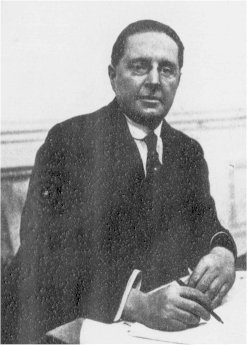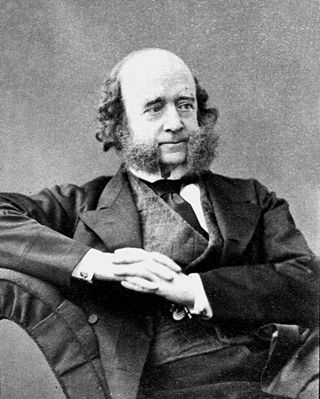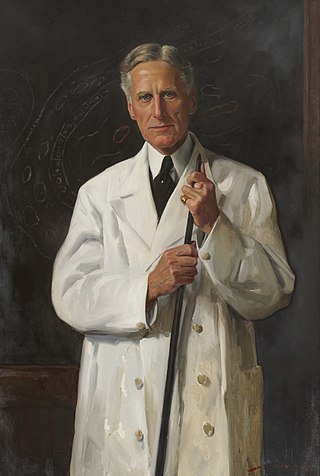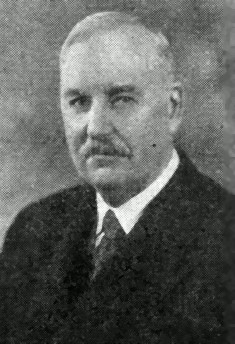
Sir Nigel Ross Playfair was an English actor and director, known particularly as actor-manager of the Lyric Theatre, Hammersmith, in the 1920s.

Narendra Babubhai Patel, Baron Patel, is a Tanzanian-British obstetrician and cross bench peer, and a former Chancellor of the University of Dundee.
Angus Macdonald FRSE FRCPE, was a Scottish physician, obstetrician and lecturer at the University of Edinburgh. He served as President of the Edinburgh Obstetrical Society from 1879 to 1881.

Sir William Overend Priestley was a British physician and Conservative Party politician. He served as Member of Parliament (MP) for Edinburgh and St Andrews Universities from 1896 to 1900.

Arthur Farre FRS was an English obstetric physician.

William Blair-Bell was a British medical doctor and gynaecologist who was most notable as the founder of the Royal College of Obstetricians and Gynecologists in 1929. Blair-Bell was considered the greatest gynaecologist of the 20th century, raising it from what was then a branch of general surgery into a separate medical specialism.

Robert Barnes was an English obstetric physician, known as a gynaecologist, teacher, author and medical politician.

Dr James Matthews DuncanFRS FRSE FRCP FRCPE LLD was a Scottish physician, known as a practitioner of and author on obstetrics.
The Obstetrical Society of London was formed in 1858 and merged in 1907 with the Royal Medical and Chirurgical Society of London to form the Royal Society of Medicine (RSM).

Thomas Hawkes Tanner was an English physician and medical writer.
Charles James Cullingworth (1841–1908) was an English gynaecologist and obstetrician.

Sir (Robert) Lambert Playfair was a British soldier, diplomat, naturalist and author.

James Haig FergusonLLD FRSE FRCPE FRCSEd was a prominent Scottish obstetrician and gynaecologist. He served as President of the Royal College of Surgeons of Edinburgh from 1929 to 1931 and was president of the Edinburgh Obstetrical Society. He chaired the Central Midwives Board of Scotland and was manager of Donaldson's School for the Deaf. In 1929 he was a founding member of the British College of Obstetricians and Gynaecologists.

Sir Ewen John Maclean was a British physician, who was the first Professor of Obstetrics and Gynaecology at the Welsh National School of Medicine.

The Edinburgh College of Medicine for Women was established by Elsie Inglis and her father John Inglis. Elsie Inglis went on to become a leader in the suffrage movement and found the Scottish Women's Hospital organisation in World War I, but when she jointly founded the college she was still a medical student. Her father, John Inglis, had been a senior civil servant in India, where he had championed the cause of education for women. On his return to Edinburgh he became a supporter of medical education for women and used his influence to help establish the college. The college was founded in 1889 at a time when women were not admitted to university medical schools in the UK.

Francis James Browne (1879–1963) was professor of obstetrics and gynaecology and first director of the obstetric unit at University College Hospital, London, which was opened in 1926. He was known as "FJ".
Sir William Gilliatt was an English gynaecologist at the Middlesex Hospital and King's College Hospital, London.

Herbert Ritchie Spencer was professor of obstetrics at University College London.

George Harold Arthur Comyns Berkeley was an obstetric physician, gynaecological surgeon and medical writer. Berkeley was most notable along with William Blair-Bell and Sir William Sinclair for creating the British College of Obstetricians and Gynaecologists. Berkeley was also noted for his writing collaborations with Victor Bonney, the book A Textbook of Gynaecological Surgery that is still considered a medical classic. It was as teacher that he excelled.
Arthur Octavius Kitson was the British husband involved in the famous legal case Kitson v. Playfair. He is also known for his 1907 biography of Captain James Cook.

















